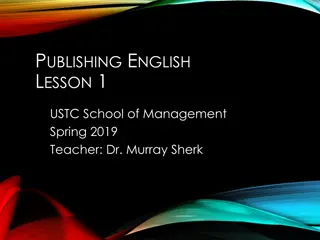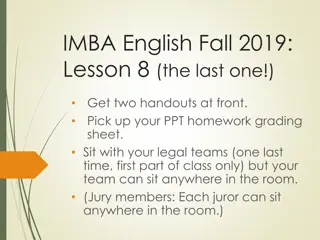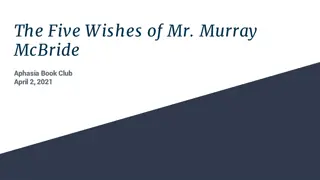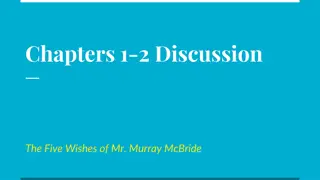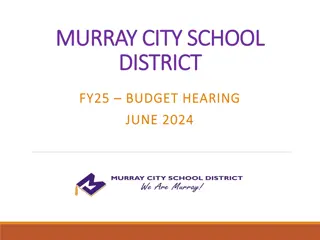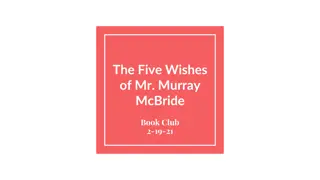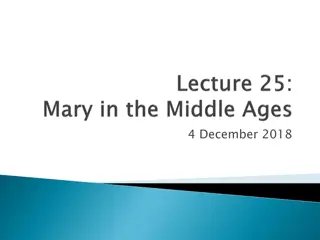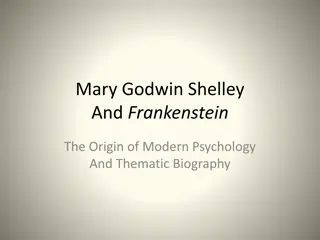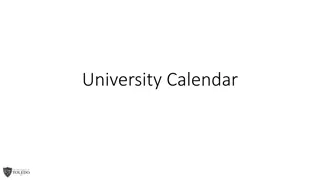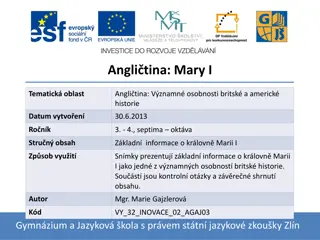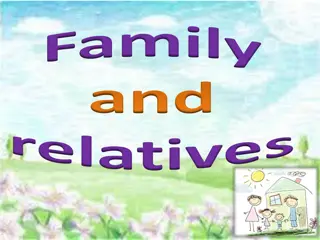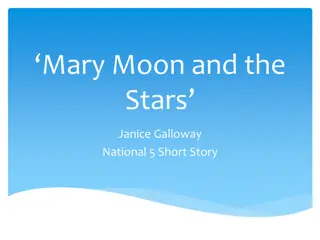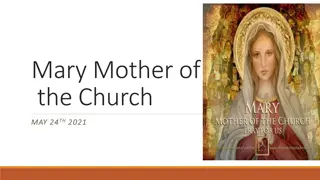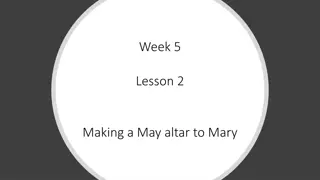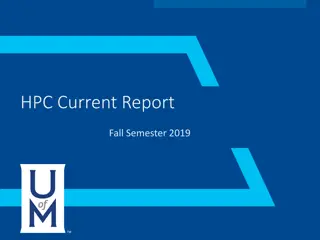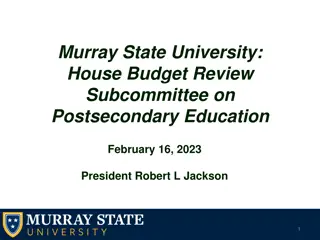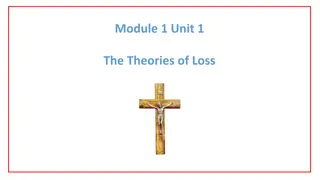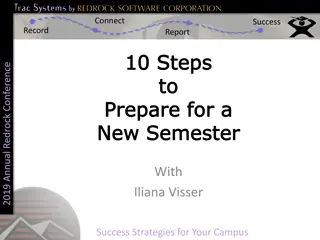IMBA Business English Lesson 1 Fall Semester 2019 with Mary Sherk and Murray Sherk
"Join the engaging IMBA Business English Lesson 1 of Fall Semester 2019 with teachers Mary Sherk and Murray Sherk. Explore pronunciation, question words, teaching experiences, and more in this dynamic course setting at USTC."
Download Presentation

Please find below an Image/Link to download the presentation.
The content on the website is provided AS IS for your information and personal use only. It may not be sold, licensed, or shared on other websites without obtaining consent from the author. Download presentation by click this link. If you encounter any issues during the download, it is possible that the publisher has removed the file from their server.
E N D
Presentation Transcript
IMBA Business English Lesson 1 FALL SEMESTER 2019
Lesson Outline Who is your teacher? Are you lucky? (Contest with prize!) Course introduction Attendance cards Pronunciation: s, z, th [ ], th [ ] Explaining, reasoning, and guessing Convincing
My name is Mary Sherk. I was born in Africa in 1938. I have been married for 2 years to Alison, my third wife, and I have 12 child. I went to the University of London, where I got a BSc degree in 1962, an MSc in 1985, and a PhD in 1989. For all these degrees, my major was Commerce. I ve been involved with three business start-ups, but only two is still going. This is now my fifth year teaching at USTC.
Question words & patterns Who? What? When? Where? Which? Why? How? How many? How much? How long? You are/were X. Are you X? Were you X? Are you really X? (implies disbelief) You have Y. Do you have Y? You <verb>ed Z. Did you <verb> Z? Did you [really] start university in 1962?
My name is Mary Sherk. I was born in Africa in 1938. I have been married for 2 years to Alison, my third wife, and I have 12 child. I went to the University of London, where I got a BSc degree in 1962, an MSc in 1985, and a PhD in 1989. For all these degrees, my major was Commerce. I ve been involved with three business start-ups, but only two is still going. This is now my fifth year teaching at USTC.
My name is Mary Sherk. I was born in Africa in 1938. I have been married for 2 years to Alison, my third wife, and I have 12 child. I went to the University of London, where I got a BSc degree in 1962, an MSc in 1985, and a PhD in 1989. For all these degrees, my major was Commerce. I ve been involved with three business start-ups, but only two is still going. This is now my fifth year teaching at USTC.
My name is Murray Sherk. I was born in Canada in 1959. I have been married for 31 years to Alison, my first and only wife, and I have one child. I went to the University of Toronto, where I got a BSc degree in 1982, an MSc in 1985, and a PhD in 1989. For all these degrees, my major was Computer Science. I ve been involved with three business start-ups, but only one is still going. This is now my eighteenth year teaching at USTC.
Next Activity Valuable Prize A bag of American bills containing more than $100 (face value) of US Cash One of you will win this today! Do you feel lucky?
Are the remaining people lucky? Was it just luck that they remain in the running? Was it random? If I (Murray) did that intentionally, are the remaining people still lucky?
Are the people at the front lucky? How much is luck involved in them still being in the running to win the money?
Are you lucky? What is luck ? What does it mean to be lucky ? What does it mean to have bad luck ?
One definition: Luck is what happens when preparation meets opportunity.
Why did we do this exercise? What do we really mean by _______? A course goal: Develop your ability to express critical thinking, logic, analysis, and precision in English. Precise definitions, careful thought, clear communication, convincing presentation These are particularly important in cross-cultural communication!
Course Introduction Syllabus sheet Course website: Get to via staff.ustc.edu.cn/~msherk
Name in native language Front Name I should call you in class Intelligence test: Do not write on the left half of the front. (That s where you will glue your selfie photo.) Student# Email address (or phone#) Country and city where you grew up: English ability: 1=terrible, 10=native speaker quality Knowledge of China: 1=terrible, 10=native Business/management experience: 1=terrible, 10=Fortune 500 CEO Back
Rearrange yourselves Sit in pairs with no two foreign students together. I.e., Each foreign student, please sit beside a domestic Chinese student. Each extra domestic student, join any pair to form a triple.
Mother tongue Teach your partner a typical greeting in your mother tongue when two friends meet, and an appropriate response. Using English, explain to your partner one famous saying (or short story) that reflects, in some way, the values of your home culture a story or saying that everybody knows in your culture.
Pronunciation Why bother to study in this course? Pronunciation needs to be good enough (not necessarily perfect) Be aware of common problems for those with your native language (Talk to me outside of class if you have major problems.)
Pronunciation Work: [s] and [z] s z sink, sank, sister, pass zoo, zen, cousin, buzz
Pronunciation Work: [s] and [z] Unvoiced Voiced s z sink, sank, sister, pass zoo, zen, cousin, buzz
Pronunciation Work: [s] and [z] Where is your tongue? Unvoiced Voiced s z sink, sank, sister, pass zoo, zen, cousin, buzz
Pronunciation Work: [s] and [z] Where is your tongue? All of tongue is inside mouth Unvoiced Voiced s z sink, sank, sister, pass zoo, zen, cousin, buzz
Pronunciation Work Where is your tongue? All of tongue is inside mouth Unvoiced Voiced s z sink, sank, sister, pass zoo, zen, cousin, buzz Tip of tongue is stuck out between teeth (~1 cm)
Pronunciation Work Where is your tongue? All of tongue is inside mouth Unvoiced Voiced s z sink, sank, sister, pass zoo, zen, cousin, buzz th (symbol: ) then, mother, breathe Tip of tongue is stuck out between teeth (~1 cm)
Pronunciation Work Where is your tongue? All of tongue is inside mouth Unvoiced Voiced s z sink, sank, sister, pass zoo, zen, cousin, buzz th (symbol: ) then, mother, breathe Tip of tongue is stuck out between teeth (~1 cm) th (symbol: ) think, thank, method, path
Pronunciation Overview Look at the handout Consonant Pronunciation You need to be aware of what your face/tongue/lips/jaw are doing. But doing it right needs to be automatic (without concentration).
If th sounds are a problem Practice saying this that there think math method Try 200 times per day!
[th] tonguetwister With partner, make up a sentence that has a LOT of [th] words. Aim for using both voiced and unvoiced [th] at the beginning, in the middle, and at the end of words. At least 15 words long and interesting! Practice saying the sentence. Better speaker coach the weaker?
Explaining, Reasoning, Guessing, and Convincing: Two exercises for quads Topic = thing, object, activity We ll talk about topics, explaining how much we like/dislike them. Sit in groups of 4 (maybe 5) as Murray combines the pairs/triples. You will be learning about each other.
Ex. 1: Explaining, reasoning, guessing First Person 1. Pick 3 topics randomly. Put in order of from best- liked to least-liked and explain why you like/dislike them. 2. Pick topic 4 and decide where you would place it in the ranking but do not tell the others. 3. Others explain where they think you will rank topic 4. 4. You say where topic 4 belongs. Partners score points = distance between their guess and your answer. (Do not change your answer!) Repeat for all partners and see who gets the lowest (best) score.
Ex. 2: Trying to convince others Everybody randomly pick one topic for yourself Round 1: Tell your partners why your topic is the BEST of the four topics, better than any of your partner s topics. Argue politely. Give reasons for disagreeing. Round 2: Tell your partners why your topic is the WORST of the four topics.
Lesson Outline Who is your teacher? Are you lucky? (Contest with prize!) Course introduction Attendance cards Pronunciation: s, z, th [ ], th [ ] Explaining, reasoning, and guessing Convincing
Homework: Due by email in about one week. Write a list of 3 things/topics/activities: one thing you love one thing you hate one thing you are neutral about (that you neither like nor dislike). Take about 100 words for each choice to explain why you love/hate/are neutral about it. Note: At most 120 words per choice! Choose your wording carefully.
Homework: Also, bring a selfie photo hardcopy to glue onto your card next week.


